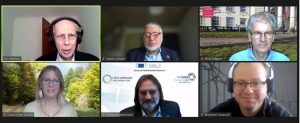On 11 October, an international audience of 150 people joined our panel of experts to discuss the impact that moving away from fossil fuels to new energy sources may have on our lives.
This online event was organised by SAPEA (Science Advice for Policy by European Academies) and Academia Europaea. You’ll find an overview of the webinar and key points from the speakers below..
Overview
Energy transition is not just about new technologies and innovation. Our current lifestyles are also contributing to energy and climate problems, and the move away from fossil fuels towards different energy systems will impact on everyone in society.

Our panel of experts
Change has to be fair and inclusive. It requires public engagement and active participation across the whole of society. Addressing these issues is even more important given the context of the upcoming global climate conference, COP26, and Europe’s goal to meet net zero emission of greenhouse gases by 2050.
This webinar, chaired and moderated by Professor Ole Petersen MAE, Vice-President of Academia Europaea, saw our panel of experts discuss these critical issues and answer questions from the audience.
Speakers
Professor Nebojsa Nakicenovic MAE, Deputy Chair of the European Commission’s Group of Chief Scientific Advisors, provided the context for the webinar with an overview of the Scientific Opinion on ‘A systemic approach to the energy transition in Europe’ and highlighted its important message of “leaving no one behind”.
Our next two speakers were SAPEA Energy Working Group Members – Professor Diana Urge-Vorsatz MAE, Director of the Center for Climate Change and Sustainable Energy Policy, Central European University; and Professor Benjamin Sovacool MAE, Professor of Energy Policy, University of Sussex. Using the SAPEA Evidence Review Report as a starting point, Professor Urge-Vorsatz discussed the inequalities in emissions across Europe and the value of avoided energy use. Professor Sovacool focused on the impact simple behaviour changes can have and the importance of balancing technological innovation and behaviour change for low-carbon transition.
Professor Nick Pidgeon, Professor of Environmental Psychology and Risk, Cardiff University, emphasised how involving the whole of society will be critical in the energy transition and that successful behaviour change approaches to reduce energy consumption will require elements such as good communications, infrastructure change and investment, and that regulation may also be needed.
Professor Eystein Jansen MAE, Professor of Earth Sciences / Paleoclimatology, University of Bergen and Member of the Scientific Council of the European Research Council, referred to the recent IPCC report and the sense of urgency to act on climate change. He described the challenges he saw ahead, expressing his concern that by setting goals for net zero emission of greenhouse gases by 2050, we may postpone necessary short-term actions, given that emissions need go down now.
